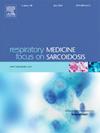Particularities of deposition of two ICS-LABA fixed dose combination dry powder aerosol drugs in the airways of COPD patients
IF 3.5
3区 医学
Q2 CARDIAC & CARDIOVASCULAR SYSTEMS
引用次数: 0
Abstract
The aim of this study was to analyse the effect of breathing parameters, age, gender and disease status on the lung doses of the two ICS + LABA fixed combination dry powder drugs. Breathing parameters of 113 COPD patients were measured while inhaling through emptied NEXThaler® and Ellipta® inhalers and the corresponding lung doses were calculated. Lung dose of Foster® NEXThaler® was superior to the lung dose of Relvar® Ellipta® in around 85 % of the patients. The average value of the ratio of bronchiolar to bronchial deposition fractions was 5.0 for Foster® NEXThaler® and 2.6 for Relvar® Ellipta®. Lung dose was sensitive to the inhalation parameters, such as peak inhalation flow, inhaled volume and breath-hold time. For both studied drugs the dose to the lungs was relatively high for moderate PIF values, but it declined for low (<35 L/min) and high (>95 L/min) PIFs. The lung dose increased by the increase of the inhaled volume, but saturated over 1.0 L of inhaled air. Longer breath-hold time led to higher lung deposition, but the dependence was drug-specific. FEV1 (%) and FEV1/FVC (%) did not influence the lung dose significantly (p = 0.05). Exacerbating patients had lower lung doses (28.8 ± 5.8 % for Foster® NEXThaler® and 23.7 ± 3.8 % for Relvar® Ellipta®) than their non-exacerbating counterparts (33.7 ± 6.1 % for Foster® NEXThaler® and for 24.9 ± 3.9 % for Relvar® Ellipta®). The exact clinical consequences of the differences between the deposition distributions of the two drugs could be assessed only by systematic clinical trials.
两种ICS-LABA固定剂量联合干粉气雾剂药物在COPD患者气道内沉积的特点。
本研究的目的是分析呼吸参数、年龄、性别和疾病状况对两种ICS+LABA固定联合干粉药物肺剂量的影响。对113例COPD患者通过空吸NEXThaler®和Ellipta®吸入器吸入时的呼吸参数进行测量,并计算相应的肺剂量。在约85%的患者中,Foster®NEXThaler®肺剂量优于Relvar®Ellipta®肺剂量。Foster®NEXThaler®细支气管沉积分数与支气管沉积分数之比的平均值为5.0,Relvar®Ellipta®为2.6。肺剂量对吸入峰流量、吸入量、屏气时间等参数敏感。对于这两种药物,中等PIF值的肺部剂量相对较高,但对于低(< 35 L/min)和高(> 95 L/min) PIF的肺部剂量下降。肺剂量随吸入量的增加而增加,但在吸入空气1.0 L以上达到饱和。较长的屏气时间导致较高的肺沉积,但依赖是药物特异性的。FEV1(%)和FEV1/FVC(%)对肺剂量无显著影响(p=0.05)。加重患者的肺剂量(Foster®NEXThaler®为28.8±5.8%,Relvar®Ellipta®为23.7±3.8%)低于非加重患者(Foster®NEXThaler®为33.7±6.1%,Relvar®Ellipta®为24.9±3.9%)。两种药物沉积分布差异的确切临床后果只能通过系统的临床试验来评估。
本文章由计算机程序翻译,如有差异,请以英文原文为准。
求助全文
约1分钟内获得全文
求助全文
来源期刊

Respiratory medicine
医学-呼吸系统
CiteScore
7.50
自引率
0.00%
发文量
199
审稿时长
38 days
期刊介绍:
Respiratory Medicine is an internationally-renowned journal devoted to the rapid publication of clinically-relevant respiratory medicine research. It combines cutting-edge original research with state-of-the-art reviews dealing with all aspects of respiratory diseases and therapeutic interventions. Topics include adult and paediatric medicine, epidemiology, immunology and cell biology, physiology, occupational disorders, and the role of allergens and pollutants.
Respiratory Medicine is increasingly the journal of choice for publication of phased trial work, commenting on effectiveness, dosage and methods of action.
 求助内容:
求助内容: 应助结果提醒方式:
应助结果提醒方式:


